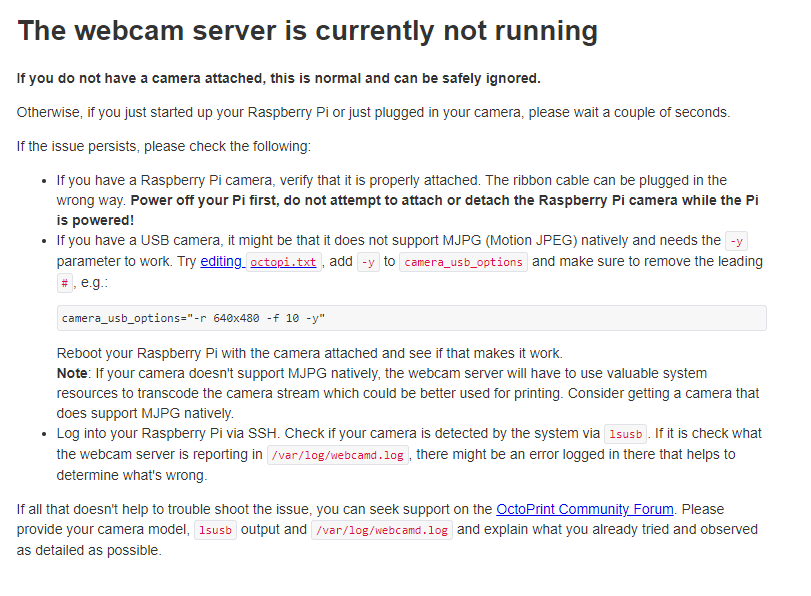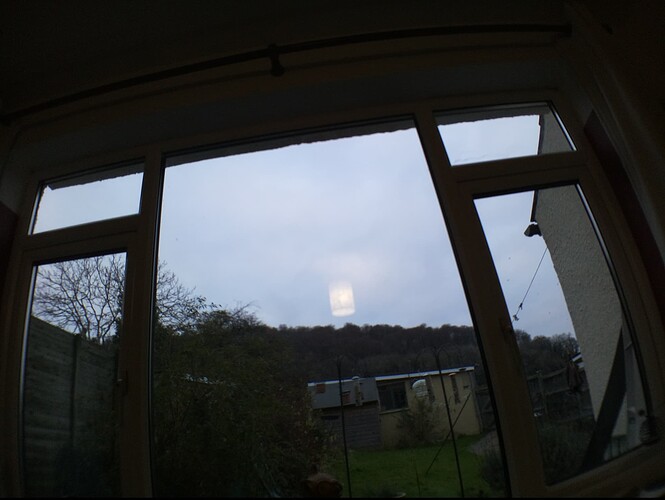What is the problem?
I've just acquired a raspberry pi 4 2GB. To get it to boot properly, I installed the latest nightly (2022-01-18_2021-10-30-octopi-bullseye-armhf-lite-1.0.0). The camera is not detected by octoprint, but works with libcamera-jpeg at the command line.
What did you already try to solve it?
I logged in via a terminal and made sure that both the camera and the I2C interface were enabled with raspi-config. I then tried running raspistill, but that command was not found, so I installed it and the command then said:
ERROR: the system should be configured for the legacy camera stack
vcgencmd get_camera says:
supported=1 detected=0
After a bit of searching, I found that I should be using libcamera-jpeg, so I tried that and it worked, producing a good jpg photo which I could scp to another machine and view.
The control tab of octoprint says that the webcam stream can't be loaded. If I visit http://octopi/webcam/?action=stream, I get this message:
Given that I can take photos with the camera using libcamera-jpeg, I know that the camera is connected correctly and working.
I've tried changing the camera setting in /boot/octopi.txt from "auto" to "raspi", but that hasn't helped. I haven't changed any other settings in that file.
In case it's relevant, I've changed a few things in /boot/config.txt (beyond the settings like start_x=1 and gpu_mem=128 that raspi-config presumably adds): I've added two lines at the end:
dtoverlay=pi3-miniuart-bt
enable_uart=1
I don't think these should affect the camera, but I don't know.
Have you tried running in safe mode?
I don't know how to do that or what that means.
Systeminfo Bundle
You can download this in OctoPrint's System Information dialog ... no bundle, no support!)
octoprint-systeminfo-20220122153640.zip (28.7 KB)
Additional information about your setup
OctoPrint version, OctoPi version, printer, firmware, browser, operating system, ... as much data as possible
Raspberry Pi 4 2 GB
Octopi version as per description above - latest nightly
Browser (on Windows 10) is Vivaldi
Printer will be a Prusa i3 MK3S+, but I haven't got as far as connecting it yet: the only things plugged into the raspberry pi are the camera and the (official raspberry pi) power supply. I wanted to check the camera worked properly before wiring it into the printer.
The only things I've done since first booting the raspberry pi with the octopi nightly are:
- Changed the user password
- Installed Vim
- Installed python3-picamera and libraspberrypi-bin (to get raspistill for testing)
- Installed my public keys and disabled password auth on ssh
- Followed the octoprint wizard to do initial set up
- Ran various command line camera tools like raspistill, vcgencmd get_camera, libcamera-jpeg etc


